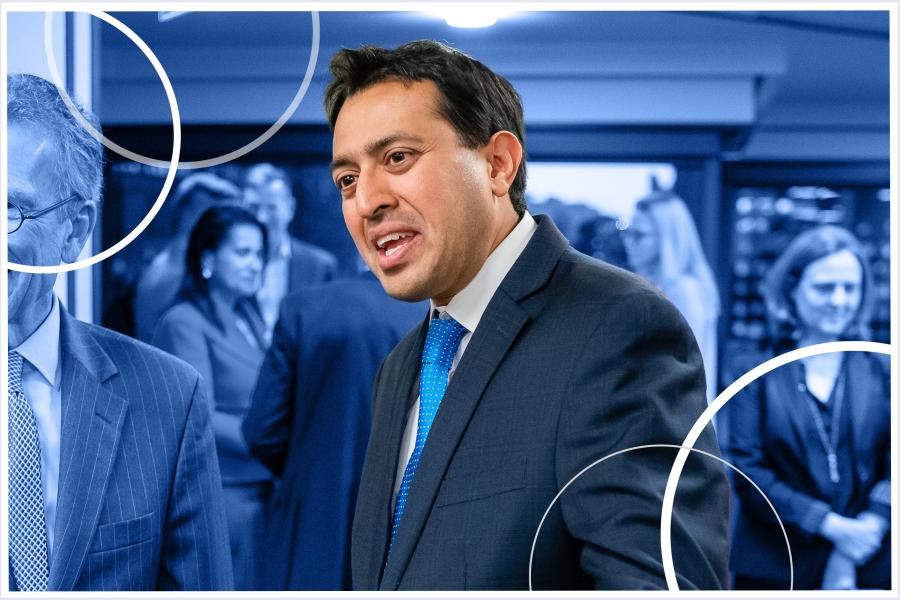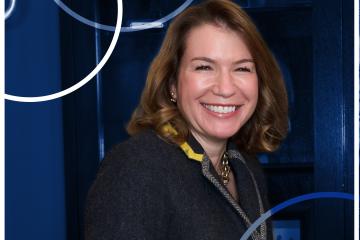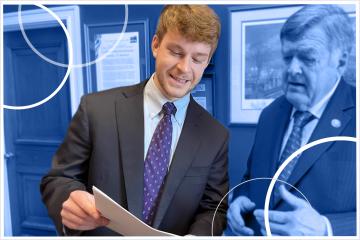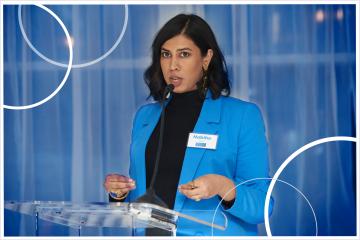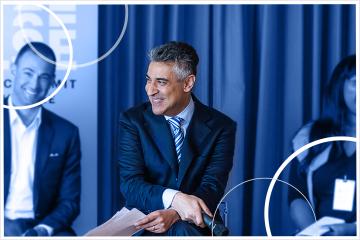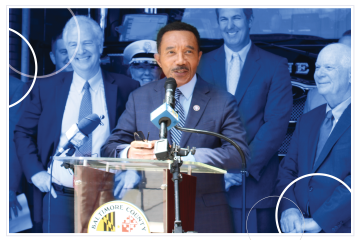The Johns Hopkins Changemakers Profile is a monthly feature spotlighting the impact of Johns Hopkins alumni in positions of influence in Washington, D.C., policymaking circles.
Anand Parekh was nearly finished with his internal medicine residency at Johns Hopkins Hospital in 2005 when he faced a dilemma.
While his colleagues were zeroing in on the specialties that would define their careers—cardiology, pulmonology, oncology—Parekh remained ambivalent about pursuing that traditional trajectory. Parekh—who earned a BA in political science, a Master's of Public Health, and a Doctor of Medicine from the University of Michigan before coming to Hopkins—wanted to specialize precisely in what he knew best: politics, public health, and medicine.
It was a good thing he followed his heart. As chief medical advisor at the Bipartisan Policy Center since 2015, Parekh has helped to lead the organization's thought leadership to inform Congress and the White House on best practices for managing a pandemic.
"I've covered medicine, public health, public service, and public policy," said Parekh, 46. "Now I get to tie it all together at the Bipartisan Policy Center where I am combining all of my interests over the last 30 years. A lot of that work helped me to provide thought leadership during COVID-19."
Occupation: Chief Medical Advisor, Bipartisan Policy Center
Age: 46
Hometown: West Bloomfield, Michigan
Education: University of Michigan, bachelor's degree, political science, 1997; master's of public health, health management & policy, 1998; doctor of medicine, 2002; residency, Johns Hopkins Hospital, 2002-2005
Parekh's expertise in preventative health care and the emergence of multiple chronic health conditions among Americans positioned him and the BPC as experts for understanding COVID-19's worst outcomes among those with diabetes and obesity.
It was during his residency at Johns Hopkins Hospital when Parekh determined that a multi-disciplinary career was more intriguing than specializing. In addition to his clinical work, Parekh took advantage of Johns Hopkins Hospital's proximity to the nation's capital —he spent six weeks at the Centers for Medicare & Medicaid Services researching proper care management for patients suffering multiple chronic conditions and six weeks at the House of Representatives working on health care issues. He also worked with Gerard Anderson, a Bloomberg School of Public Health professor, studying the surge of patients suffering from multiple conditions whom Parekh was increasingly treating at the hospital.
"Proximity to Washington D.C. is a great advantage of Johns Hopkins," Parekh said.
As the residency came to an end—and after consultation with former Johns Hopkins Chair of Medicine Myron Weisfeldt—Parekh determined his next step had to be public service.
"As much as I enjoyed seeing patients, what was getting me up in the morning was being involved in activities that weren't helping just one patient at a time but that could help hundreds or thousands or millions of patients at a time," he said.
The roots of those multiple health-related passions trace back to the suburbs of Detroit, where his mother was a family physician for 45 years and his father worked as a hospital finance administrator for 30 years. And they have carried forth in his own life: Parekh is married to Rinky Bhatia, a Johns Hopkins cardiologist. The couple lives in Montgomery County with their three children.
In 2005, his first public service position was more prescient than he could have known at the time. At the U.S. Department of Health and Human Services (HHS), Parekh joined a government-wide team tasked with developing strategies for how federal agencies should respond to a pandemic. At the time, H5N1, better known as "avian flu," was spreading in Southeast Asia.
"I was part of the group that made the case to Congress why preparedness needed to be funded," he said. The federal response to COVID-19 was "built upon much of the 15 years of pandemic preparedness work that started in 2005."
His proudest accomplishments while serving as HHS deputy assistant secretary of health included his leadership during the Obama administration formulating and executing a $650 million program to back state and local investments in prevention of chronic diseases, to "make the healthy choice the easiest choice," he said.
He also led the Department of Health and Human Services' Multiple Chronic Conditions Initiative, which connected directly to his work with Anderson on multiple chronic conditions such as diabetes, high blood pressure, cancer, obesity, and COPD (Chronic Obstructive Pulmonary Disease). The initiative provided a strategic framework that continues today for developing the best delivery and payment models to provide health care to people who suffer from multiple chronic diseases, for training the workforce to care for this population, and for sharing the best self-care tools with these individuals, and for expanding research on this population, he said.
"It was my signature work there," he said. "It stemmed from my time at Johns Hopkins as a clinician and the research I did with Gerry Anderson."
He joined the Bipartisan Policy Center in 2015, intent on continuing the emphasis on preventative medicine as a cost-and-life-saving model for the United States. Five years later, when COVID-19 hit, Parekh pivoted into his prior expertise related to pandemics. The BPC quickly developed comprehensive, bipartisan reports offering recommendations on how the federal government could manage the outbreak. The reports frequently cited the Johns Hopkins University's Center for Health Security and Coronavirus Resource Center.
The center's January 2021 report, COVID-19: Urgent Federal Actions to Accelerate America's Response, recommended that the U.S. government expand COVID-19 testing and contact tracing, ensure equitable vaccine distribution, increase funding to counties and states, address racial disparities and other items—citing the Coronavirus Resource Center's positivity tracker and the Center for Health Security's recommendations for prioritizing vaccine rollouts.
The emergence of COVID-19 and the worst outcomes for those with preexisting conditions—like those patients with multiple chronic diseases—only further buttressed the case for prioritizing preventative measures. He calls COVID-19, obesity, and drug overdoses/addiction the "triad of public health challenges of our time and of our future."
"COVID is the public health crisis of the last few years; overdoses and addiction are the public health crisis of the decade; and obesity is the public health crisis of the century," he said.
Each year since 2017, the BPC has issued an annual report detailing all federal funding allocated to help states address the opioid epidemic. And it has been providing recommendations for addressing poor nutrition and obesity for the past decade. It also has devised a five-year plan to help state and local public health officials regain the public trust lost when pandemic responses were politicized.
In December 2019, just as COVID-19 was coming ashore in the United States, Parekh captured his years of policy development around chronic disease prevention in his first book, Prevention First: Policymaking for a Healthier America. Its endorsers prove Parekh's ability to transcend politics. The forward was written by former Sens. Tom Daschle, Democrat of South Dakota, and Bill Frist, Republican of Tennessee.
"Dr. Parekh's book is a reminder that we have a shared responsibility to improve the health status of all Americans," they wrote. "He is intimately familiar with federal policy issues related to prevention, public health, preparedness, and population health."
Parekh's work recently gained him a place on Washingtonian's list of D.C.'s 500 most influential people of 2023. It cited his efforts leading "the development and dissemination of Public Health Forward, a five-year vision for how the U.S. government could achieve a healthier America." The magazine also revealed his hidden talent: "Playing Pachelbel's Canon in D on the piano."
Posted in Politics+Society




